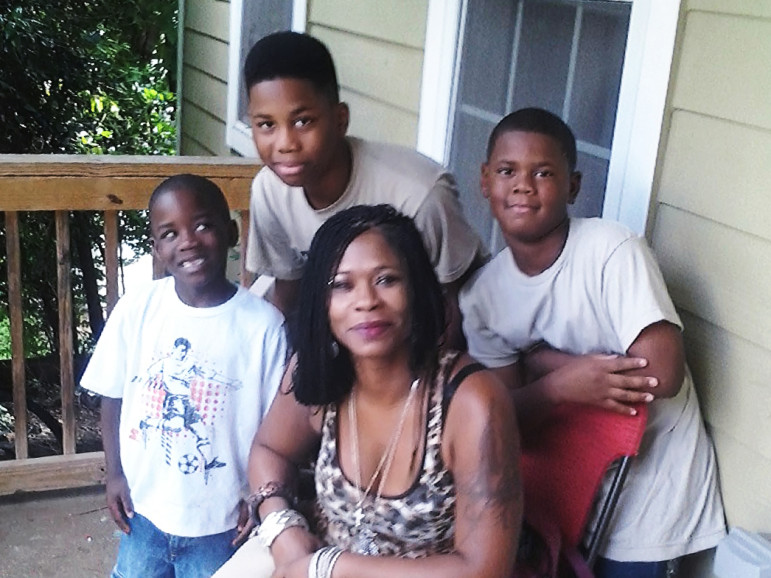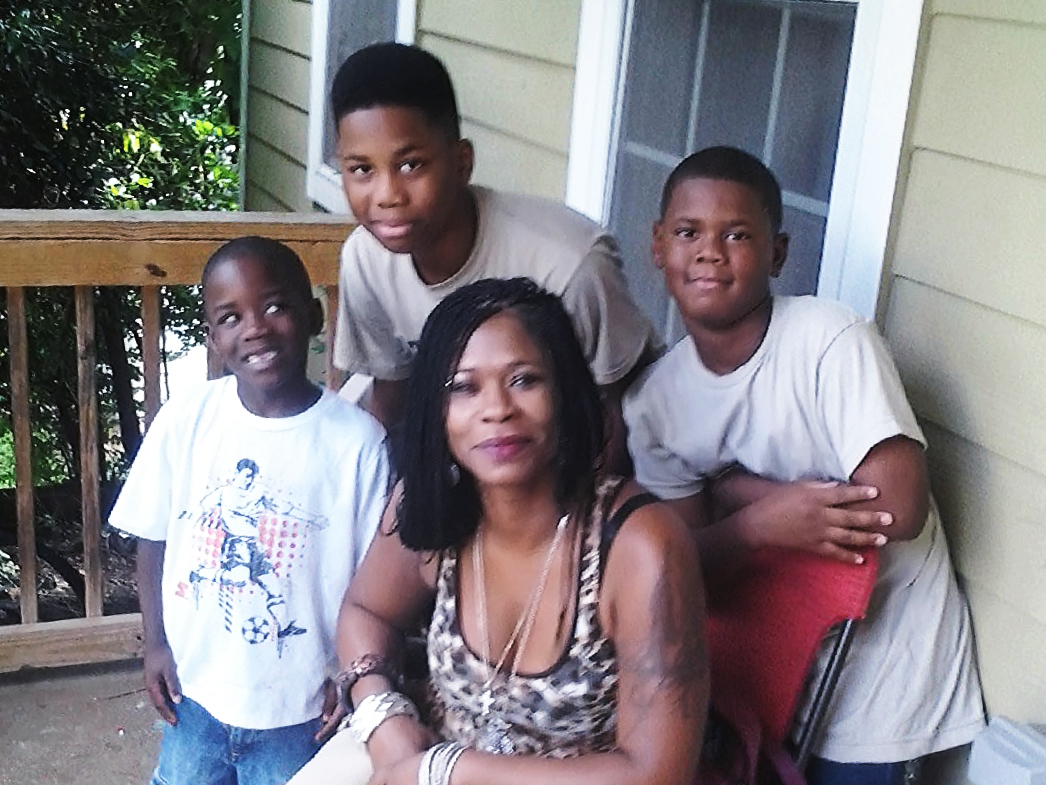
Woods family
Donna Woods with three of her boys, Damyuss, now 8, Dayzhon (Chopper), 15 and Dazmine, 12.
ATLANTA — Bravely bearing the burden of taking care of a very sick parent can take a toll on children, particularly if there is no other parent around. How do you look out for them and best meet their needs?
Dayzhon “Chopper” Woods, 15, started tenth grade at B.E.S.T. Academy in August with the same angst that millions of kids across the nation felt as their summer ended and school doors opened to herald a new year.
There were clothes and shoes to buy, supplies to gather, hair to cut and a new schedule to adjust to.
Chopper, though, was dealing with something other than the beginning of his sophomore year— a single mother whose legs had just became paralyzed from metastatic breast cancer that had spread to her spine.
One of four school-aged boys in the Woods household, Chopper is the one that Donna turns to the most physical support — to lift her, to clean her, to feed her. Darius, 18, and a senior at B.E.S.T, is captain of the football team and doesn’t get home until about 8 p.m. Dazmine, 12, isn’t big enough to lift her out of bed. Damyuss, 8, still thought his mother might regain use of her legs and dreamed of pushing her around their home in a wheelchair in the mean time.
And so as Donna Woods’ condition worsened throughout August, Chopper was the one lying in bed next to her at night so he could administer her medicine when pain racked her body, carry her to the bathroom and change her nightgown and bed linens if she couldn’t make it in time.
When his mother was rushed to Emory Hospital Midtown in an ambulance in mid-August, he slept in the same clothes for two nights on a fold-out bed in her room, missing a day of school on Monday. Only when Donna insisted he go home did he grudgingly leave her side.
When asked on the way home how he was managing his mother’s illness, he said quietly, “I just try not to think about it. If I can keep my mind off it, that’s the best thing.”
When illness becomes routine
The story of the four boys is an example, albeit perhaps extreme, of the silent sadness that children may be experiencing from living with very sick or dying parents. It also is a tale of how needs can sometimes be masked — and how sometimes they may go unmet.

Woods family
Donna Woods with her daughter, Ashley.
Donna’s cancer, diagnosed in 2005, is embedded in the family’s story. So, too, is poverty. Donna has been unable to work for years. The family has faced myriad issues together, from Donna’s illness to Damyuss’s serious asthma, to trying to keep the lights on and a roof over their heads.
Their mother has been sick most of their lives — and in the case of Damyuss, his entire life.
Donna’s cancer recurred with metastatic vengeance in 2009. Doctors at Emory’s Winship Cancer Institute tried treatment after treatment, enrolling her in clinical trials and gaining “compassionate use” access for the latest drugs. Their aggressive treatments worked — until recently. There is no cure for metastatic breast cancer, only treatments that can delay an inevitably painful death.
The boys — and their 23-year-old sister Ashley and her one-year-old son — have become so accustomed to their mother’s visits to Emory, the chemotherapy treatments, the days of illness following them — that it seems not to faze them. They know that Saturday mornings are for housecleaning, Sunday is for church, and that every other day brings responsibility for taking care of Mama. Because Ashley works at night, the boys now also have added babysitter to their duties.
They seem to take it in stride
But in August, Darius had chest pains, and Ashley had to take him to the E.R. Chopper was losing sleep as he watched over his declining mother, in whose bed he slept each night.
The night Donna was rushed to the hospital in an ambulance when her lower body wasn’t working, the other boys one by one piled into the bed with Donna, too.
“I woke up the next morning, and all four of them were piled in the bed with me,” she said, laughing at the thought. “I don’t know how there was room for them all.”
Joshua Moore, head football coach at B.E.S.T. Academy and a mentor to Darius, said that “emotionally, he’s handled it(his mother’s illness) really well. It’s been an ongoing thing for so long.”
That said, “he holds a lot of it in and lets it off on the football field.”
Darius also has begun to struggle academically, Moore said. While Moore thinks Darius could be a good Division III candidate, his grades might interfere.
Moore said the football program has great academic support and that his staff works with Darius.
But in August, Darius went missing from practice for two weeks. As it turns out, the phone and electricity had been cut off, about the same time Donna’s condition worsened. Moore sent a team parent to the house to make sure Darius was OK.
“I remind him that he has to keep me informed, that I’m here to help,” Moore said. Moore regularly takes Darius home after practice and tries to fill in gaps where he can. For example, when Darius had chest pains, Ashley discovered that Darius’s Medicaid had expired; he had turned 18. So he didn’t have insurance for a few weeks. Coach Moore found a way to pay for Darius’s pre-season physical and ER treatment.
Moore said he remembers the days when Donna would be at all Darius’s games and donate things for children who needed them.
“I just want to do right by her and by Darius,” Moore said. “I just want to see him get into college.”
Hurdles all around
As Donna became sicker over the past two years, finances became more pressing. Donna suffered terrible lymphedema, painful swelling that often results from surgery to remove cancerous breast tissue and lymph nodes, in her left arm. A sleeve to relieve pain was not covered by her Medicaid.
So Chopper would spend nights on the computer trying to find a cheap sleeve or agencies that might pay for the sleeve.
Dazmine, who has a cherubic face and dimpled smile, began getting into trouble at school for picking on other children.
Damyuss’s asthma seemed to worsen, and Donna kept an even closer watch on him, limiting his outdoor time.
Kathy Gurland, a social worker in Brooklyn who started Peg’s Group, an association to help families of cancer patients deal with a cancer diagnosis, said she thinks that a social worker somewhere along the line could or should have been helping the children.
“The fact that the children’s needs haven’t been addressed is negligence,” Gurland said. But, while others agree, they are quick to note that funding does not exist for social workers in public schools. And, while teachers are the “front line,” they cannot be expected to know everything that is going on with all of their students.
“It really takes a team approach to respond to a situation like this,” said Taryn Lindhorst, the Carol LaMare associate professor of social work at the University of Washington. “And mostly that’s not what happening.”
It’s important for those who work with children and teens to know more about the children’s backgrounds and — if possible — to have some training in psycho-social support.
“I think the two biggest pieces (of helping children with sick parents) are counseling at school on a regular basis and working with the family member who is sick and the child at home,” said Jenna Tutjer, executive director of the Achievement Center at the School of Social Work at Columbia University.
Also, teachers, even though already asked to do a lot, could benefit from in-service training on looking for signs of grief in children, Tutjer and Gurland said.
“Maybe a day of training once a year,” said Gurland to help them to look out for changed behavior in a student. Depending on the age of the child, he or she might respond differently to grief, Gurland and Tutjer said.
“You might see a student in class looking despondent, or having angry outbursts” that are expressions of grief, Tutjer said, that might result in a child being disciplined rather than being helped.
Support groups at school or after school can help, Tutjer said. These can be extremely important for children who are dealing with many stressors — such as living with a single parent, living in an unsafe neighborhood.
“Their baseline is already so high, and that toxic stress can have a life-long effect,” Tutjer said.
In the case of a family such as the Woods dealing with protracted stressors and grief, it is important that adults who work with such a family have some experience in grief counseling in children.
“Their grief response is often after the fact, or it may come on the anniversary day that they may have done something in particular with their mother. So they may get into a fight on the school ground and get in trouble, when it really is about their grief,” Lindhorst said. “People have to be alert.”
Words not meant for children
While those closest to the children, such as Coach Moore, have been alert, there still have been challenges — in part because the challenges have been so many.
Moore spends as much time as possible with Darius, makes sure he is physically healthy. He gives him rides home, he encourages him academically.
But Moore can’t be there 24-7, and so, when Donna once again had to be transported to the ER Saturday night, Ashley and Chopper rode behind her in Donna’s old Toyota, which has a cracked windshield. After they arrived, Donna was put on life support. The children stayed through late in the day on Sunday. Chopper’s face was like a stone. Rivers of tears rolled down Ashley’s face; she had planned a birthday celebration for Demetrius and was hoping to take pictures of her mother as they celebrated Demetrius’s life.
On Monday, Demetrius’s birthday, doctors told Ashley she needed to decide whether she wanted to keep Donna on life support. The cancer was devouring Donna’s emaciated frame, and a terrible sore on her backside was threatening to turn dangerous.
“Why do I have to make this horrible decision on what should be the happiest day of my life?” she said, sobbing. She also wondered whether she should bring the boys down to see their mother, perhaps for the last time. How would they react to the breathing tube, Donna’s swollen face and blood splattered from a central line inserted into her neck? What should she do?
Donna became alert enough to guide her. She motioned to her daughter to “pull.”
“Pull the tube, Mama?”
Donna motioned again.
“Pull the plug? What do you want me to do?”
Ashley decided to have her mother moved to the inpatient hospice unit at the hospital, on the third floor. Nurses explained that they would keep Donna on life support there for 72 more hours.
The next afternoon, on Sept. 9, Donna passed quietly away.
Ashley debated whether to even tell her brothers that day.
“How do I tell Pookey (Damyuss)?” she asked, crying. “He still asks every day ‘when’s Mama coming home?’”
She decided to tell them. At first, they laughed.
“They thought I was kidding. And I said ‘Why do you think I’d kid about that?’”
Chopper ran out of the house. Darius said he thought it might have been for the best, as Donna had suffered so much in recent days. Dazmine and Damyuss cried.
The next day, Chopper and Ashley were back at the hospital, where a hospice social worker tried to help them with their grief.
Chopper kept his head in his hands most of the time but did not cry. Ashley cried once, wiping away her tears with the palms of her hands. The social worker then walked them through various things they needed to do — call a funeral home to get their mother’s body out of the morgue, call the county to see about an indigent burial, file paper work so they won’t be evicted Nov. 30, when Donna’s lease runs out, and file for Ashley, at 23, to be guardian of the three boys who are minors.
The social worker advised them to stay focused and to think about their school work and what their mother wanted for them.
She asked when Ashley thought the boys should return to school.
“I think they’ll be OK by Monday,” she said on Wednesday.
But Chopper had another view.
“I can go back tomorrow,” he said. “I’m fine.”
































